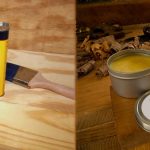Oil vs Water Based Polyurethane: Choosing the Ultimate Finish for Perfection
Whether you are reviving hardwood floors or crafting new furniture, two titans can shape your creation. These are water-based polyurethane and the oil-based type. Each possesses unique attributes that can sculpt the very essence of your creation.
So, oil vs water based polyurethane, which wood finish is the best? Well, the “best” finish hinges on your vision. The oil-based type is best for creating a timeless allure. It radiates richness and depth. Its rival, water-based polyurethane, boasts rapid drying and a low odor profile.
In this article, we will unveil the distinct qualities of these two finishes. By the end of the write-up, you will have harnessed knowledge to choose what finish aligns with your signature of excellence.
An Overview of Oil vs Water Based Polyurethane
Here is a table illustrating the similarities and differences between these two finishes:
| Oil-Based Polyurethane | Vs | Water-Based Polyurethane |
|---|---|---|
| Longer drying time | Drying Time | Rapid drying |
| Adds warm, amber hue | Color Tone | Maintains natural wood color |
| Strong odor during application | Application Odor | Low odor during application |
| Higher VOC emissions | VOC Emissions | Lower VOC emissions |
| Excellent durability | Durability | Good durability |
| Fewer coats required | Number of Coats | More coats often needed |
| Longer time between re-coating | Recoating Time | Shorter time between re-coating |
| Can yellow with age | Yellowing Over Time | Minimal to no yellowing |
| Longer drying time contributes to energy consumption | Environmental Impact | Lower VOC emissions contribute to reduced environmental impact |
An Overview of Oil-Based Polyurethane Paint
This finish is made of natural oils such as linseed or lung oil. It also has resins that amplify the protective nature of the paint. The result is a liquid that is easy to apply and infiltrates all the grains of your wood.
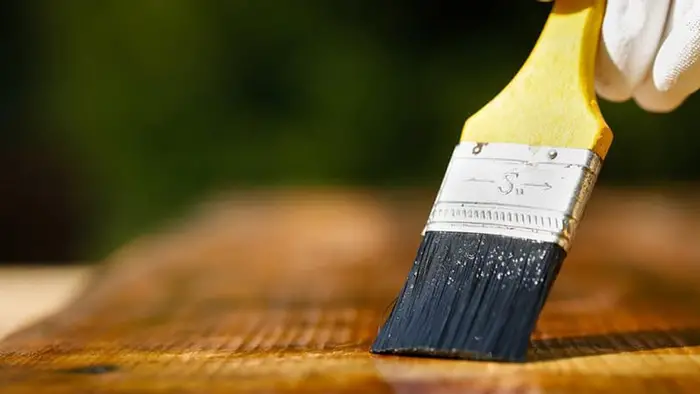
Unlike ordinary paints or stains, this coating goes deep into your wood fibers, protecting them against wear and tear.
This type has the following characteristics:
- Deep penetration: Unlike other surface-level solutions, this paint will immerse itself safely in the wood’s core. This translated to a long-lasting effect.
- Timelessness: This finish has an inviting warm tone. This conjures a timeless elegance that will echo through the ages.
- Potential yellowing: This finish will tend to be yellow when exposed to the sun. This is a natural aging princess, which will affect the appearance of your furniture later.
An Overview of Water-Based Polyurethane
This is an environmentally friendly option. It provides several similar benefits to the traditional oil type while maintaining a commitment to being environmentally friendly.
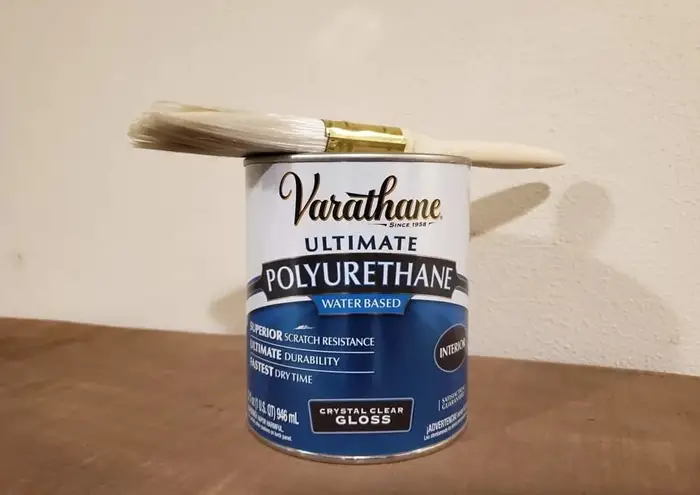
Instead of oils, resins, and other additives are blended into water to create a crystal-clear solution. This solution has the following characteristics:
- Clear appearance: With this paint, your wood will not have an amber-blue hue. You will have its original color and tone.
- Modern look: This finish is clear and shiny. It adopts a modern look that will complement stylish furniture made in the 21st century.
- Needs multiple coats: To achieve substantial protection of your wood, you need to apply more coats compared to what you would have if you were using the oil type.
Oil vs Water Based Polyurethane: Which One Should You Choose?
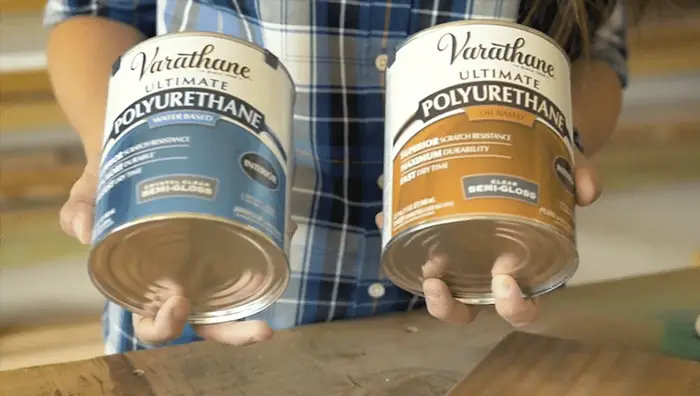
Below are the factors you should consider when choosing between the two:
1. Appearance and Color Enhancement
When you opt for oil-based polyurethane, you will get a warm, classic touch to your wood surfaces. This finish will enhance your creation by imparting a rich, amber-toned hue that exudes tradition and timelessness.
On the other hand, the water-based type leans towards a modern aesthetic. It will ensure that your surfaces are clear and transparent. If you need to maintain your wood color, this is the finish.
2. Your Patience
Patience is a virtue. And when it comes to choosing between these two finishes, this saying holds. Considering the oil-based type, you should be prepared to embrace long drying periods. On average, it will take about 24 hours to dry. If you were applying 3 coats, those are three days for drying.
On the flip side, water-based polyurethane offers a swifter drying experience. The short drying period means you can apply multiple coats sooner than its counterpart. On average, we found this finish dried in under six hours. This is 4 times faster than its competitor.
3. Odor Sensitivity
Every finish emits a smell during application. One notorious type that is known for the notable presence of odor is oil-based polyurethane. It has a strong smell that lingers in the air.
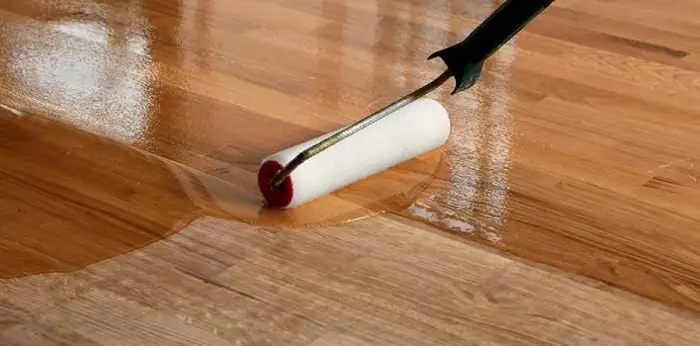
The water-based type, on the other hand, brings a breath of fresh air. It has a lower odor profile compared to its counterpart. It emits a mild scent during application, which is less overpowering. If you are sensitive to odors, you better go with the latter.
4. Durability and Protection
Oil-based finish is renowned for its excellent durability and robust protection. It forms a resilient layer on your woodwork against rigorous daily use. If your project involves placing the creation in areas with elements of heavy wear, then you can only trust oil-based finishes.
While water-based finishes also offer good durability, they are not anywhere close to their counterparts. You will require more coats of this to achieve the same effectiveness as its competitor. As such, this type is only best for projects that will experience minimal wear.
5. Environmental Impact
In the 21st century, environmental consciousness is paramount. So, when choosing between these two titans, you should consider a friendly choice to this planet.
Oil-based polyurethane comes with a higher environmental footprint. It has a more extended drying period and high VOC emissions. Also, if you dry using electricity, the longer drying times pose a challenge.
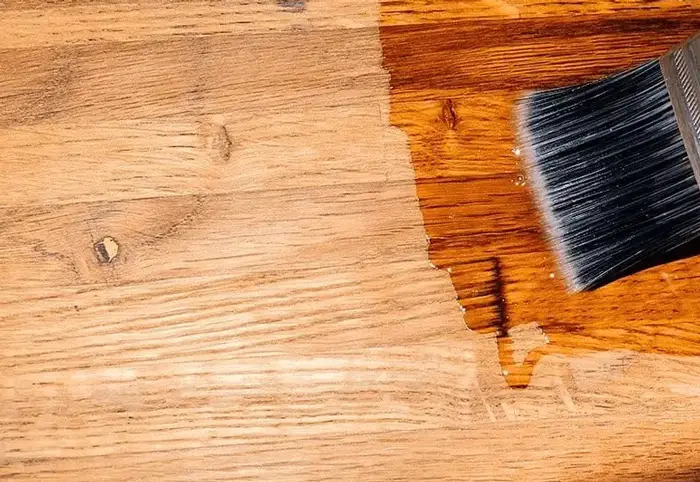
Their water-based counterparts offer a greener alternative. They have a lower environmental impact and produce fewer VOCs during application. Hence, they contribute to better air quality and reduced pollution. Also, if you use electricity to dry, this type will consume less power.
It is a clear choice if you are environmentally conscious.
6. Health Impacts
Beyond the aesthetics and functionality of wood finishes, your health and well-being are paramount considerations. Oil-based finishes emit strong odors and VOCs, as mentioned. These contribute to air pollution. They will cause respiratory irritations, headaches, and dizziness.
The water-based type offers a more health-conscious choice with a lower odor profile. This finish’s mild scent will not lead to health issues like headaches.
7. Cost
Oil-based finishes are more affordable compared to their water-based counterparts. This low cost is a result of their straightforward production. If you are on a tight budget, this is the type for you.
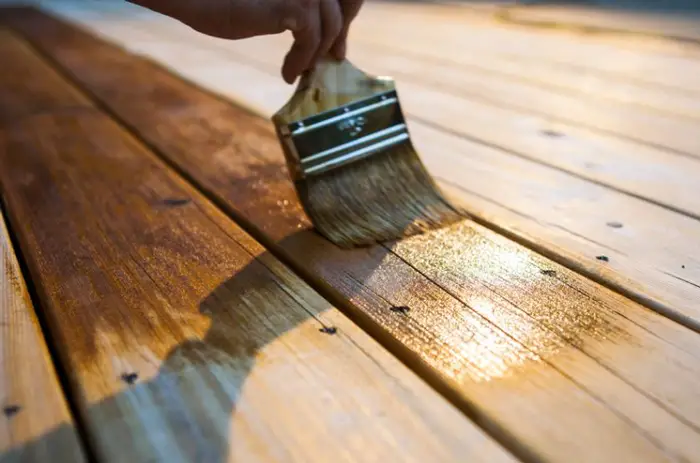
However, its counterpart is more expensive because of its water formulation and quicker drying time. While it might be costlier, it offers benefits like low odor and others mentioned above. So, you might overlook this factor if it aligns with everything you need in a finish.
8. Additional Tools
When working with oil-based finishes, you will need safety tools to protect yourself from VOCs. This adds to the overall costs. You will need safety goggles, a mask, and gloves.
Since water-based finishes are the greener option, you do not need any additional tools or safety equipment. They have less odor and toxins, and applying them outdoors is just enough to protect you from side effects.
FAQs
Below are answers to questions that you might have regarding oil vs water-based polyurethane.
Q: How do I clean brushes and tools after using each type of polyurethane?
For the oil-based type, you need to use spirits or paint thinner. You can also use kerosene or petrol to clean them. For water-based, just dip them in water and use soap to achieve maximum cleanliness.
Q: Can I apply oil-based polyurethane on top of water-based and vice versa?
No. Water-based finishes do not provide a good base for oil-based polyurethane. You will have adhesion issues. However, you could apply a water-based type on top of the oil-based type without any issues.
Q: Is one type of polyurethane finish better for certain wood types?
Both oil and water-based finishes are good on various types of wood. However, the oil type tends to do better on woods like oak and walnut. This is because its amber tone compliments those woods.
The water-based type does best on maple or pine due to its clear finish, which is suitable for lighter woods.
Conclusion
The choice between oil vs water based polyurethane boils down to careful considerations. As such, we cannot point at one and say this is what you should go with. Your finish will depend on your desired appearance, drying time, and health impacts.
If you are an environmental enthusiast, you must consider one with fewer repercussions for the planet. The optimal finish for your project is the one that will pass all your preferences and priorities. Armed with this knowledge, you are now poised to craft not just woodwork but masterpieces.




